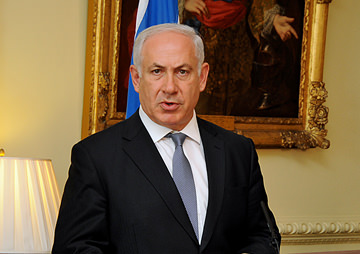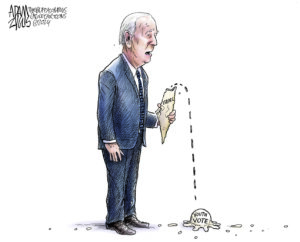Is Israeli PM Netanyahu’s Case Against Iran Collapsing?
Israeli Prime Minister Benjamin Netanyahu has determinedly beaten the drums for war with Iran. Israeli Prime Minister Benjamin Netanyahu. Downing Street (CC BY-NC-ND 2.0)
Israeli Prime Minister Benjamin Netanyahu. Downing Street (CC BY-NC-ND 2.0)
This post originally ran on Juan Cole’s Web page.
Israeli Prime Minister Binyamin Netanyahu has determinedly beaten the drums for war with Iran, though his lack of any actual overt action on that front has suggested to many observers that he uses the Iran issue to distract the international community from the Israel project of annexing the Palestinian West Bank and keeping Gaza a huge outdoor prison.
But even the plausibility of Netanyahu’s assertions about Iran have increasingly been brought into question by Israeli officials themselves.
This week Uzi Eilam, a former head of Israel’s Atomic Energy Agency, insisted that Iran is at least a decade from having nuclear weapons capability and suggested that Iran probably does not even want such a capability. Netanyahu has been saying Iran is around the corner from the bomb since at least the early 1990s.
Meanwhile, International Atomic Energy Agency inspectors confirmed that Iran is upholding its side of the bargain struck with the US and the UN Security Council when negotiations began last fall. Iran has diluted 75% of its stock of uranium enriched to 19.75 percent. That stockpile, intended to fuel Iran’s medical reactor to produce isotopes for treating cancer, had been of concern because Western powers felt it would be easier to enrich it further, to the 95% needed for a nuclear bomb, than is the case with the 5% enriched uranium used in nuclear power plants.
Another stumbling block is Iran’s construction of a heavy water reactor at Arak. Heavy water reactors typically produce plutonium, which can be used in bomb-building. But Iranian officials say they are entirely willing to modify the Arak nuclear facility so as to forestall it producing significant amounts of plutonium.
Israeli propaganda has gone on and on about Iran denying the Holocaust, as though it were a consensus position in the Iranian elite (it is not). Nor is it entirely clear what it has to do with anything. In any case, Foreign Minister Mohammad Javad Zarif told German media that the Holocaust was a ‘horrifying tragedy’ that must not be repeated and defended his stance before parliament. He implicitly argues that former president Mahmoud Ahmadinejad’s Holocaust denial made Iran a laughingstock in international diplomacy and made it easier for Israel and the US to isolate it and heavily sanction it.
Iran’s increasing transparency about its civilian nuclear enrichment program, which it insists is for electricity generation, its acknowledgment of the Holocaust, and its willingness to go an extra mile to allay Western fears, are hallmarks of the presidency of Hassan Rouhani, who was elected last summer. Rouhani’s Iran isn’t so easy to turn into a pariah, though it is still heavily sanctioned.
No such posture can, moreover, be misunderstood by the world community in such a way that they might authorize military force there.
Netanyahu is losing the argument.
—-
RT: “Allies ask Netanyahu not to undermine Iran deal without credible ‘plan B’”
Independent journalism is under threat and overshadowed by heavily funded mainstream media.
You can help level the playing field. Become a member.
Your tax-deductible contribution keeps us digging beneath the headlines to give you thought-provoking, investigative reporting and analysis that unearths what's really happening- without compromise.
Give today to support our courageous, independent journalists.









You need to be a supporter to comment.
There are currently no responses to this article.
Be the first to respond.